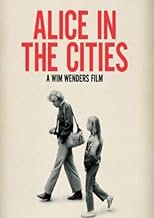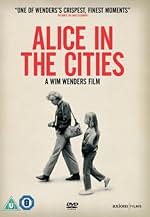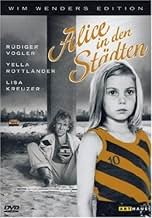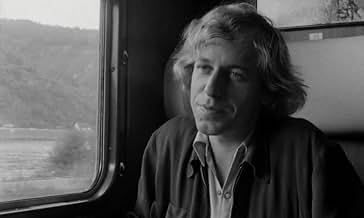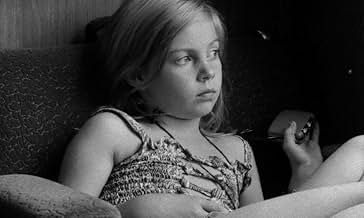AVALIAÇÃO DA IMDb
7,8/10
14 mil
SUA AVALIAÇÃO
Um jornalista alemão leva uma menina de nove anos após encontrar sua mãe em um aeroporto de Nova Iorque.Um jornalista alemão leva uma menina de nove anos após encontrar sua mãe em um aeroporto de Nova Iorque.Um jornalista alemão leva uma menina de nove anos após encontrar sua mãe em um aeroporto de Nova Iorque.
- Direção
- Roteiristas
- Artistas
- Prêmios
- 1 vitória e 1 indicação no total
Lisa Kreuzer
- Lisa van Damm
- (as Elisabeth Kreuzer)
Julia Baier
- Young Girl on Ferry
- (não creditado)
Chuck Berry
- Chuck Berry
- (cenas de arquivo)
- (não creditado)
Peter Genée
- Man Looking at Monitor in New York Airport
- (não creditado)
- …
Peter Handke
- Man at Chuck Berry concert
- (não creditado)
Jane Jarvis
- Organist at Shea Stadium
- (não creditado)
Micky Kley
- Woman Behind Philip and Alice on Plane
- (não creditado)
Martin Müller
- Man on Empire State Building Roof
- (não creditado)
- Direção
- Roteiristas
- Elenco e equipe completos
- Produção, bilheteria e muito mais no IMDbPro
Avaliações em destaque
Alice in the Cities (1974)
If there are movies, like comedies and horror films, that are better seen in a crowd, there are some movies that might be best seen alone. This is one of them, and I didn't realize until I was almost done because it had become so absorbing I was really enjoying my isolation within the movie.
The plot is simple, and I won't say how it happens, but a nine year old Dutch-German girl is left with a German man in the United States, and he takes care of her as they search for a way to find her mother or grandmother. Their first step is to fly back to Amsterdam, and then in Germany in a little car they poke around looking for her home.
It's a road movie, though unlike any other. The two main characters are about as perfect and as natural as it gets. The man is a thoughtful, drifting writer and photographer, an artist in the counter-culture way of the times. He has no real ambition, but observes the world with poetic appreciation. So when this girl is made part of his life, he takes it in stride. That's key to the mood of the film, that this very unlikely situation can continue for so long because he just goes with the flow. There is no running to the police, no panic. But there is no sense either that this is an accepted new relationship. It's for the moment, but the end of the moment is continually deferred.
The girl goes with the flow as well, and is as brilliant as the man at being natural in front of the camera, often doing nothing. She's made to be lovable, of course, but not in any coy or sentimental way. (If this were a Hollywood film we'd all be barfing by now.) All of this matters because it isn't what's happening that really matters, but it's just being together, the two of them, and then (you realize) the three of you. You wish it was you who was doing this utterly humane, deeply felt act of traveling and being supportive and seeing modern (1973) Germany.
The filming is simple black and white but brilliantly effective, down to the heart wrenching last shot (which was probably the most expensive). The setting is actually a surprise in that you never think of the ordinary middle class and industrial parts of middle Europe being so interesting. The music comes and goes, and refers to the earthy music of the time, mostly American blues based stuff.
In a little way this reminded me of "Stranger than Paradise" and when I connected the two I saw how much Jarmusch (in that film) owed to these art film experiments just a few years earlier. And now that I think of it, this one is more touching and important even if "Stranger than Paradise" is more inventive. "Alice in the Cities" makes a case for a kind of film we don't see being made now, and which might have another vogue one of these years in reaction to the general highly refined, highly artificial worlds of most movies today. I hope so.
If there are movies, like comedies and horror films, that are better seen in a crowd, there are some movies that might be best seen alone. This is one of them, and I didn't realize until I was almost done because it had become so absorbing I was really enjoying my isolation within the movie.
The plot is simple, and I won't say how it happens, but a nine year old Dutch-German girl is left with a German man in the United States, and he takes care of her as they search for a way to find her mother or grandmother. Their first step is to fly back to Amsterdam, and then in Germany in a little car they poke around looking for her home.
It's a road movie, though unlike any other. The two main characters are about as perfect and as natural as it gets. The man is a thoughtful, drifting writer and photographer, an artist in the counter-culture way of the times. He has no real ambition, but observes the world with poetic appreciation. So when this girl is made part of his life, he takes it in stride. That's key to the mood of the film, that this very unlikely situation can continue for so long because he just goes with the flow. There is no running to the police, no panic. But there is no sense either that this is an accepted new relationship. It's for the moment, but the end of the moment is continually deferred.
The girl goes with the flow as well, and is as brilliant as the man at being natural in front of the camera, often doing nothing. She's made to be lovable, of course, but not in any coy or sentimental way. (If this were a Hollywood film we'd all be barfing by now.) All of this matters because it isn't what's happening that really matters, but it's just being together, the two of them, and then (you realize) the three of you. You wish it was you who was doing this utterly humane, deeply felt act of traveling and being supportive and seeing modern (1973) Germany.
The filming is simple black and white but brilliantly effective, down to the heart wrenching last shot (which was probably the most expensive). The setting is actually a surprise in that you never think of the ordinary middle class and industrial parts of middle Europe being so interesting. The music comes and goes, and refers to the earthy music of the time, mostly American blues based stuff.
In a little way this reminded me of "Stranger than Paradise" and when I connected the two I saw how much Jarmusch (in that film) owed to these art film experiments just a few years earlier. And now that I think of it, this one is more touching and important even if "Stranger than Paradise" is more inventive. "Alice in the Cities" makes a case for a kind of film we don't see being made now, and which might have another vogue one of these years in reaction to the general highly refined, highly artificial worlds of most movies today. I hope so.
A man around thirty, German journalist Philip Winters, travels alone in a rented car all over the States. He makes pictures with a Polaroid camera, which he wants to include in a story that he has to write for a publishing house. But the results of his photographic efforts do not correspond with what he believed to see when he took the pictures. And he does not even dare to assimilate his impressions into a written form. It seems, as if he keeps seeing nothing but the void, either the uniform monotony of always recurring urban landscapes on his lonely journeys or, in the single rooms of the motels, a television program that constantly reels off the same dull and dreary patterns. And how can you put emptiness into words?
A silenced bewilderment has already become routine in the completely paralyzed life of a man, who only pities himself, and who apparently has lost all access to his fellow men. Therefore the girlfriend in New York, to whom he wants to unburden all his world-weariness can do nothing for him but show him the door, saying: "Nobody told me how to live either."
So he forgot how to live, our very typical hero of modern times. But just as in a children's story rescue suddenly appears in the shape of a wondrous fairy, Philip Winters also has a surprising encounter, which will help him to determine his position in this world anew. The unexpected enlightening figure is a child, nine-year-old Alice. Her mother, whose acquaintance Philip had somehow forcibly made at the airport counter, has let her down, leaving behind a succinct message, in which she asks Winters to take provisionally charge of the girl until she will follow them to Amsterdam in a later airplane.
The mother does not appear though, and thus Philip Winters does not have any other alternative but to go on looking after the child, a responsibility he most willingly would like to avoid. But Alice remains persistent, she scents the possibility of an exciting adventure. She mentions a grandmother, who possibly lives in Wuppertal, West Germany. Unwillingly Winters bows to his fate, but after a few abortive attempts he simply deposits her at a police station and goes to a Chuck Berry concert on his own.
That could be the end of the story. But as I already mentioned, Alice is a fairy. And so she does not only come back, but also actually succeeds in getting a mechanism going in Philip Winters which seemed to be already dead and buried: the reference to the other one, the preparedness to get involved with his fellow creatures. At the end of the film he seems to be recovered, the train in which he and Alice are sitting, is obviously moving along on newly built tracks, the decisive switching of the points has been made.
At least for the time being. For it is exactly in this hopeful and promising moment that we have to leave this wonderful movie. We are just allowed to throw another brief glance at the protagonist, who is sitting in the compartment joyfully united with Alice, a moment before the camera steps back and rises into the air, moving irresistibly away from the scene, until it depicts a vast panoramic view. But our eyes are still fixed on the train that hastens steadily through the immense landscape heading towards a destiny unknown.
A silenced bewilderment has already become routine in the completely paralyzed life of a man, who only pities himself, and who apparently has lost all access to his fellow men. Therefore the girlfriend in New York, to whom he wants to unburden all his world-weariness can do nothing for him but show him the door, saying: "Nobody told me how to live either."
So he forgot how to live, our very typical hero of modern times. But just as in a children's story rescue suddenly appears in the shape of a wondrous fairy, Philip Winters also has a surprising encounter, which will help him to determine his position in this world anew. The unexpected enlightening figure is a child, nine-year-old Alice. Her mother, whose acquaintance Philip had somehow forcibly made at the airport counter, has let her down, leaving behind a succinct message, in which she asks Winters to take provisionally charge of the girl until she will follow them to Amsterdam in a later airplane.
The mother does not appear though, and thus Philip Winters does not have any other alternative but to go on looking after the child, a responsibility he most willingly would like to avoid. But Alice remains persistent, she scents the possibility of an exciting adventure. She mentions a grandmother, who possibly lives in Wuppertal, West Germany. Unwillingly Winters bows to his fate, but after a few abortive attempts he simply deposits her at a police station and goes to a Chuck Berry concert on his own.
That could be the end of the story. But as I already mentioned, Alice is a fairy. And so she does not only come back, but also actually succeeds in getting a mechanism going in Philip Winters which seemed to be already dead and buried: the reference to the other one, the preparedness to get involved with his fellow creatures. At the end of the film he seems to be recovered, the train in which he and Alice are sitting, is obviously moving along on newly built tracks, the decisive switching of the points has been made.
At least for the time being. For it is exactly in this hopeful and promising moment that we have to leave this wonderful movie. We are just allowed to throw another brief glance at the protagonist, who is sitting in the compartment joyfully united with Alice, a moment before the camera steps back and rises into the air, moving irresistibly away from the scene, until it depicts a vast panoramic view. But our eyes are still fixed on the train that hastens steadily through the immense landscape heading towards a destiny unknown.
Chance encounters that often seem purposeless may, upon reflection, turn out to be life changing experiences. Such is the case for German photographer Philip Winter (Rudiger Vogler) in Wim Wenders 1974 film Alice in the Cities, the first of three Wenders road pictures (Wrong Move, Kings of the Road). Traveling through the East Coast of America, Winter is overcome by lethargy and the monotony of the American landscape with its relentless vistas of billboards, chain motels, and fast food restaurants and has little interaction with his surroundings other than to take pictures as a detached observer. At one motel stop, he becomes so infuriated with commercials on television that he destroys the television set.
Blocked in his attempt to write an article describing his journey, he decides to return to Germany but finds that the flights are delayed for a day. At the airport, he strikes up a conversation with a German woman (Lisa Kreuzer) and her nine-year old daughter Alice (Yella Rottländer) also trying to return home. The three share a hotel room and things seem routine until the mother inexplicably departs, leaving a note telling Winter to bring Alice to Amsterdam where she will meet them. The mother, however, does not arrive and Winter is left to care for Alice until relatives can be located. Their relationship, at first filled with resentment, gradually develops into one of trust as they drive together in a rented car trying to locate Alice's grandmother in Wuppertal and the cities of the Ruhr.
Alice in the Cities is a sensitive and thoughtful film that suggests that everything in life has a purpose and that guidance is available if we remain open. The film mixes humor and pathos as the reluctant friends must contend with loneliness and alienation, themes often prevalent in Wenders' films. Rottländer's performance as Alice strikes just the right note. She is believable as the bright, feisty, and often charming little girl and her performance never crosses the line into sentimentality. As Winter slowly begins to see the time with her as an opportunity to embrace rather than as an obstacle to overcome, he finds that being responsible for another person can be transforming and that his quest is not so much for Alice's grandmother as for his own self.
Blocked in his attempt to write an article describing his journey, he decides to return to Germany but finds that the flights are delayed for a day. At the airport, he strikes up a conversation with a German woman (Lisa Kreuzer) and her nine-year old daughter Alice (Yella Rottländer) also trying to return home. The three share a hotel room and things seem routine until the mother inexplicably departs, leaving a note telling Winter to bring Alice to Amsterdam where she will meet them. The mother, however, does not arrive and Winter is left to care for Alice until relatives can be located. Their relationship, at first filled with resentment, gradually develops into one of trust as they drive together in a rented car trying to locate Alice's grandmother in Wuppertal and the cities of the Ruhr.
Alice in the Cities is a sensitive and thoughtful film that suggests that everything in life has a purpose and that guidance is available if we remain open. The film mixes humor and pathos as the reluctant friends must contend with loneliness and alienation, themes often prevalent in Wenders' films. Rottländer's performance as Alice strikes just the right note. She is believable as the bright, feisty, and often charming little girl and her performance never crosses the line into sentimentality. As Winter slowly begins to see the time with her as an opportunity to embrace rather than as an obstacle to overcome, he finds that being responsible for another person can be transforming and that his quest is not so much for Alice's grandmother as for his own self.
The references between Wenders' films and cinema in general are utterly diverse. They reach from direct hints and citations to more subliminal connections. And therefore, mainly the early films of De Sica resonate in Alice in the Cities, especially the neo-realistic masterpiece Ladri di biciclette. In the main protagonists' (journalist Philip and young girl Alice) search for her grandmother in the German Ruhrpott, we can see traces of the father's and his son's search for the bicycle in Rome. Both films are open for sidelong glances, for moments that don't want to give in the dramaturgic concept of the story. But, actually, you don't have to watch De Sica's film to lose yourself in the sheer beauty and poetry of Alice in the Cities, where documentary elements win over fiction and found pictures triumph over staged ones; when shots of moments fall out of the stream of images and reveal an almost boundless yearning.
I might have been Alice. Or was I too fearful, too cared for, too lost in myself? Was I born at the wrong time? When I watch this film, I'm reminded of a line from another of director Wim Wenders' films: "Life is in colour, but black & white is more realistic". I'm still not sure if I believe that, but there are memories that seem more a thing of light and shadow than of colour. And this is, after all, a black & white film. "Alice in the Cities" is as much about its other main character, Philip Winter, as Alice herself. Him, I have been. Lost out on the highways of New Brunswick and Maine, lonely hotel holidays all by myself with no one to comfort or to talk with. I wanted to smash that television just as he does in an early scene, but it was my only companion through the long night ahead.
"Alice in the Cities" is the first of three consecutive films by Wim Wenders about the open road, each starring Rüdiger Vogler as a similar, if not identical character. The second, "The Wrong Movement" (Falsche Bewegung) (1975), is an incredibly difficult slog of total human alienation. The third, and much better than the second film, "Kings of the Road" (Im Lauf der Zeit) (1976) is similar to this one, as Mr. Winter continues his journeys through the German countryside.
This is a film about childhood relationships - not those we have with our peers, but those of a greater age. This makes perfect sense to me, as I would without fail seek out the company of an adult over the fleeting fancies of ones closer to me. To me, anything past fully grown would blur together, all except for the very old. Philip isn't comfortable with children, just as I have become over time. It is a hallmark of those who feel that they have never outgrown their own childhood, who feel so lost inside the adult world that the past feels foreign to a present that will never fit. Their belief that living in the future is futile keeps them grounded in today, their only salvation from a life spent dreaming.
Reality is harsh in "Alice in the Cities". The release comes where life lives. The precious and precocious sensation of human interaction runs like a vein through the center of everything. This is a story suitable for anyone, not because it holds back, but because it is all in. In love with the very same world it fears, holding the hands of the same dream on whose feet it steps on. Like we all do in life. This film feels exactly like those first two or three years of your earliest memories. If you let it, you'll be taken further back than you'd have ever imagined.
"Alice in the Cities" is the first of three consecutive films by Wim Wenders about the open road, each starring Rüdiger Vogler as a similar, if not identical character. The second, "The Wrong Movement" (Falsche Bewegung) (1975), is an incredibly difficult slog of total human alienation. The third, and much better than the second film, "Kings of the Road" (Im Lauf der Zeit) (1976) is similar to this one, as Mr. Winter continues his journeys through the German countryside.
This is a film about childhood relationships - not those we have with our peers, but those of a greater age. This makes perfect sense to me, as I would without fail seek out the company of an adult over the fleeting fancies of ones closer to me. To me, anything past fully grown would blur together, all except for the very old. Philip isn't comfortable with children, just as I have become over time. It is a hallmark of those who feel that they have never outgrown their own childhood, who feel so lost inside the adult world that the past feels foreign to a present that will never fit. Their belief that living in the future is futile keeps them grounded in today, their only salvation from a life spent dreaming.
Reality is harsh in "Alice in the Cities". The release comes where life lives. The precious and precocious sensation of human interaction runs like a vein through the center of everything. This is a story suitable for anyone, not because it holds back, but because it is all in. In love with the very same world it fears, holding the hands of the same dream on whose feet it steps on. Like we all do in life. This film feels exactly like those first two or three years of your earliest memories. If you let it, you'll be taken further back than you'd have ever imagined.
Você sabia?
- CuriosidadesThe novel "Tender is the Night" by F. Scott Fitzgerald is seen on the coffee table of Phil Winter's girlfriend. A character in the novel, Rosemary Hoyt, was inspired by Fitzgerald's affair with actress Lois Moran, who appears in this film as an airport hostess. It was Moran's last movie.
- Erros de gravaçãoCrew are reflected in the side of the car (at around 46 mins - sound man, microphone and other crew. This is why so many cars in movies appear dirty or have a matte paint job.).
- Citações
Lisa - Alice's Mother: What are you writing?
Philip 'Phil' Winter: The inhuman thing about American TV is not so much that they hack everything up with commercials, though that's bad enough, but in the end all programmes become commercials. Commercials for the status quo. Every image radiates the same disgusting and nauseated message. A kind of boastful contempt. Not one image leaves you in peace, they all want something from you.
- ConexõesFeatured in Mia toso makryni apousia (1985)
- Trilhas sonorasUnder the Boardwalk
Written by Kenny Young and Arthur Resnick
Performed by The Drifters and The Rolling Stones
Principais escolhas
Faça login para avaliar e ver a lista de recomendações personalizadas
- How long is Alice in the Cities?Fornecido pela Alexa
Detalhes
- Data de lançamento
- País de origem
- Idiomas
- Também conhecido como
- Alice in the Cities
- Locações de filme
- Empresas de produção
- Consulte mais créditos da empresa na IMDbPro
Bilheteria
- Orçamento
- DEM 500.000 (estimativa)
- Faturamento bruto mundial
- US$ 59.294
- Tempo de duração
- 1 h 53 min(113 min)
- Cor
- Mixagem de som
Contribua para esta página
Sugerir uma alteração ou adicionar conteúdo ausente


